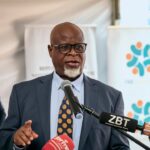The Presidential Delivery Unit (PDU) remains optimistic that Zambia’s School Health Programme (SHP) will play a vital role in helping the country achieve universal access to health by 2030. This transformative initiative aims to integrate health services into the education system, ensuring that every learner has access to essential healthcare and education, creating a healthier, more productive generation of Zambians.
A Commitment to Health and Education Integration
At the forefront of this initiative, President Hakainde Hichilema has shown a strong commitment to improving the health of the nation’s youth. In a recent move, the President donated BP machines to all health rooms in schools across the country, enhancing the programme’s capacity to monitor and respond to students’ health needs. This gesture highlights the government’s dedication to both the well-being and academic success of learners.
Western Province Minister Kapelwa Mbangweta echoed this sentiment, describing the SHP as a transformative programme that has made significant strides in improving the health and education outcomes of learners across the nation. Speaking during the graduation of 500 school health teachers in Mongu, Minister Mbangweta emphasized the importance of the initiative in ensuring that learners receive quality health services in addition to their education.
The programme’s expansion has been particularly notable in Western Province, where 48 school health rooms have been built in four districts—Nkeyema, Nalolo, Mongu, and Limulunga. Minister Mbangweta expressed his confidence that these developments will provide learners with access to the necessary health education and services, promoting better overall well-being.
Collaboration and Stakeholder Engagement
Minister Mbangweta also called on all stakeholders to collaborate in creating a province where every learner has access to both quality health and education services. This highlights the importance of a united effort in addressing the intertwined issues of health and education to ensure long-term success.
PDU Head Kusobile Kamwambi further emphasized the complementary nature of the SHP with the government’s free education policy. “Free education doesn’t just come with a pronouncement and inviting a million or two more children into school. We look at all the other aspects of education, which includes quality health,” she noted. The government is enthusiastic about the programme’s potential to improve not just access to education but also health, which is integral to achieving the target of universal health access by 2030.
The Role of Healthy Learners and Expanding the Programme
Brian Kayongo, Vice President of Healthy Learners Partnerships and Technical Assistance, praised the government for its commitment to the well-being of children. He highlighted the significant progress made in implementing the SHP, noting that it has laid a solid foundation for future generations. “By building and equipping health rooms, training teachers in community health, and fostering peer support through buddy groups, the programme ensures students get care as soon as they need it,” Dr. Kayongo explained.
With the graduation of 500 health teachers, the programme is expanding rapidly, now including 1,552 qualified tutors across three provinces: Muchinga, Southern, and Western. Dr. Kayongo confirmed that the organisation is working closely with the government to further expand the programme to reach even more schools and learners.
Southern Province’s Impressive Progress
Southern Province is also seeing considerable progress, with 511 teachers and school administrators graduating from the SHP. The province currently benefits 142 schools, supported by 95 health facilities, reaching over 170,000 learners. Southern Province Minister Credo Nanjuwa highlighted the impact of the programme on the educational and health outcomes of the region’s students.
In a speech read by Southern Province Deputy Permanent Secretary Yalonda Malunga, Minister Nanjuwa reaffirmed the province’s support for the SHP and its potential to improve the health and education system at large.
Reaching Millions of Learners Across Zambia
The success of the SHP is evident in its growing reach. As of now, the programme has touched the lives of 967,368 learners, trained 5,304 teachers, and built health rooms in 598 schools across the country. By the end of the year, the SHP is expected to service over 1.5 million learners, making a significant impact on the nation’s future.
PDU Director Alfred Sakwiya emphasized that the graduation of 500 school health teachers represents much more than an academic achievement—it’s a demonstration of the government’s commitment to shaping the future of Zambia through better health and education.
Conclusion: A Healthier Future for Zambia’s Youth
The School Health Programme is not just about providing medical care; it’s about ensuring that Zambia’s future generations have the tools and support they need to thrive both academically and physically. By integrating health services into schools and training educators to support this initiative, the government is paving the way for a healthier, more educated population.
With continued investment and collaboration from all stakeholders, Zambia is on track to achieve universal health access by 2030, creating a brighter, healthier future for all its citizens.






